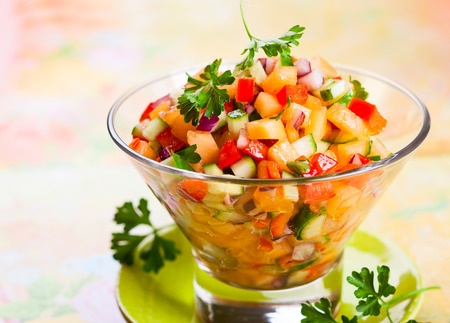Fruit is an important part of a cancer-protective diet. Research suggests that fruit may reduce risk of cancers of the lung, esophagus, mouth, pharynx, larynx and stomach.
Whether you’re planning an exciting getaway or a relaxing “stay-cation”, these fruity recipes will make you feel like you’ve taken a trip to the tropics.
Kiwifruit
A medium kiwifruit has only 42 calories and serves up almost a day’s supply of vitamin C. One fruit provides 2 grams of fiber and a healthy dose of the mineral potassium. Kiwifruit also contains lutein, a cancer-fighting antioxidant and a relative of beta-carotene that appears to help protect against eye disease.
Honeydew Kiwi Smoothie
- 2 cups cubed honeydew melon, frozen or well chilled
- 1 ripe kiwi, peeled and slice
- 2 Tbsp. fresh lime juice
- 1 Tbsp. honey
- 2 mint sprigs, optional, for garnish
In blender, whirl melon, kiwi, lime juice and honey until smoothly blended. If using frozen melon, divide smoothie between 2 tall, narrow glasses. If using chilled melon, pour the smoothie into glasses filled with ice cubes. Garnish each glass with mint sprig, if desired, and serve immediately.
Makes 2 servings.
Per serving: 120 calories, 0 g fat (0 g saturated fat), 32 g carbohydrates,
2 g protein, 3 g dietary fiber, 35 mg sodium.
Mango
This sweet fruit provides beta-carotene and other carotenoids. Foods that contain carotenoids probably protect against cancers of the mouth, pharynx, larynx, esophagus and lung. Mangos are a rich source of vitamin C and folate. They also provide phenols, a class of phytochemicals studied for their cancer-prevention benefits.

Rice Salad with Mango and Black Beans
- 2 cups cooked brown rice
- 1 (15 oz.) can black beans, rinsed and drained
- 3/4 cup diced mango, 1/4-inch cubes
- 1/2 cup chopped and seeded plum tomato
- 1/3 cup chopped green onion, white and green parts
Dressing
- 1/3 cup orange juice
- 1-2 Tbsp. fresh lime juice
- 1 serrano chile pepper, or jalapeño pepper, coarsely chopped
- 1 tsp. ground cumin
- 1 tsp. dried oregano
- 1 Tbsp. canola oil
- Salt and ground black pepper
- 2-3 Tbsp. chopped fresh cilantro
Combine rice, beans, mango, tomatoes and green onion in mixing bowl. This step may be done up to 2 hours before serving with salad covered and refrigerated.
For dressing, in blender or bowl of mini-food processor, whirl orange and lime juice, chile pepper, cumin and oregano until chile is ground up. Add oil and whirl to blend. Season to taste with salt and pepper. This may be done up to 2 hours before serving, and dressing refrigerated.
Just before serving, pour dressing over salad and toss with fork to combine (if salad has been refrigerated, let sit at room temperature for 20 minutes before dressing). Spoon salad into wide, shallow serving bowl, and sprinkle on cilantro. Serve immediately.
Makes about 4 1¼ cup per servings.
Per serving: 284 calories, 5 g total fat (< 1 g saturated fat), 51 g carbohydrate,
10 g protein, 10 g dietary fiber, 201 mg sodium.
Papaya
Larger than mangos and easy to cut, melon-textured papayas provide a host of vitamins and minerals including vitamin C, folate and potassium as well as beta-carotene and lycopene. Foods containing lycopene seem to protect against prostate cancer.
Papaya Salsa with Jicama “Chips”
- 2 cups diced papaya
- 2/3 cup plum tomato, seeded and chopped
- 1/2 cup chopped seedless European cucumber, peeled
- 1/4 cup finely chopped red onion
- 1 serrano or jalapeno pepper, seeded and finely chopped
- 2 Tbsp. fresh lime juice
- 1/4 tsp. ground cumin
- 1/2 tsp. sea salt
- Ground black pepper, to taste
- 1 medium jicama
- 1/3 cup chopped cilantro
In mixing bowl, combine papaya, tomato, cucumber, onion and chile pepper, tossing gently with fork. In small bowl, whisk lime juice and cumin with sea salt and 3-4 grinds pepper until salt dissolves. Pour over salsa and toss to combine. Set aside for up to 20 minutes.
Meanwhile, use paring knife to peel brown skin from jicama and cut away fibrous layer beneath it. Cut a thin slice off bottom and stand jicama on work surface. Using large knife, cut jicama vertically into 1/8- to 1/4-inch slices. Stack oval slices, including uneven ones, and halve vertically. Cut slices longer than 4 inches into thirds. Sliced jicama can be stored in bowl of water in refrigerator for up to 8 hours if not serving immediately. Drain and pat dry before using.
Just before serving, mix cilantro into salsa. Spoon salsa into serving bowl in center of serving plate. Arrange sliced jicama around it to use as dippers.
Makes 4 servings.
Per serving: 105 calories, < 1 g total fat (0 g saturated fat, 25 g carbohydrate, 2 g protein, 10 g dietary fiber, 304 mg sodium.





